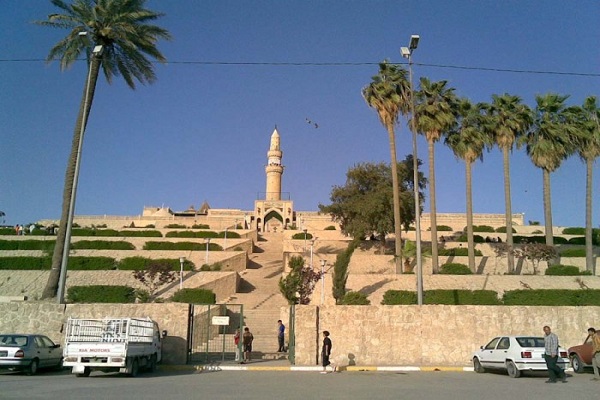Four years have passed the control of Mosul by Iraqi forces in 2017 yet the city still resembles the dark days where most of its infrastructure, religious and cultural places were destroyed, most notably the Nabi Yunus Mosque and shrine.
On June 10th 2014, the Islamic State in Iraq and Syria ISIS seized Mosul, the capital of Ninawa and the largest city of the province, a month and half later, the extremist militants have detonated the Nabi (prophet) Yunus Mosque on July 24th 2014.
The mosques and shrines are of particular importance to Mosulis, and after seven years people still recall the scene of the mosque detonation.
Debris of the mosque still at site
"The reason behind delay of the reconstruction of the Nabi Yunus Mosque is the existence of archaeological sites in the shrine," said Amar al-Ali, of media department for the Sunni Waqf (Endowment).
The mosque and shrine of Nabi Yunus were built at the top of a 40- meter hill called Tuba (brick) Hill, while archeological researches argue it has been built upon an Assyrian palace for King Esarhaddon, son of Sennacherib and grandson of King Sargon, who ruled the Neo-Assyrian Empire (681-669 BC).
Therefore, the Archaeology Office of Ninawa has signed a contract with a German company to excavate and exploration the hill for five years, according to a Sunni waqf employee.

The mosque of Nabi Younus in Mosul ahead of its demolition by IS militants.
The five-year contract for documentary work in Tel Tuba, which began in 2018 and over 2019 and early 2020, stopped because of Covid-19, said Khairuddin Ahmed, assistant inspector of Ninawa archeology.
“The process of exploration and excavation was carried out by Ninawa archeologists in cooperation with University of Heidelberg in Germany.” Any archeological pieces found is to be handed over to the general archaeological team in Baghdad per the contract, he added.
The process of exploration and excavation was carried out by Ninawa archeologists in cooperation with University of Heidelberg in Germany
Following the process of exploration and excavation, the mosque is to be rebuilt in the same place.
Khairadin said the mosque would be next to the palace of Esarhaddon “which rebuilt at the nearest time, to become a tourist destination."
The mosque of Nabi Yunus is owned by the Sunni endowment as a part of Tel tuba while the King Esarhaddon belongs to Ninawa archaeology office.
Election campaign and reconstruction projects
Manhal Khabaz, minister of industry and minerals, promised Mosul residents to rebuild the Nabi Yunus Mosque within just 10 days, in a press conference early July. The minister's promise was defined as "pre-election" campaign for Iraq's October 2021 parliamentary elections.
In reply to the industry minister, Faisal Jaber, an archaeologist of Mosul, said, "Talking about rebuilding a mosque in ten days is an election campaign and that the project will not be carried out until the end of the exploration and excavation process which may take years.”
On the hill where the mosque was built, there are a series of tunnels about 800 meters. The tunnels are the base of the mosque's pillars, “so we cannot take heavy equipment and cars to the hill for the reconstruction project," Jaber said.
According to art data, the reconstruction is almost impossible due to the series of tunnels in the hill. “The University of Heidelberg will not be able to fulfil its mission over the next few years, and Ninawa archeology have stopped reconstruction work because of this process," Jaber added.
Footage of Nabi Younus Mosque detonation
The Nabi Yunus Mosque is considered one of the historical sites of the Islamic world, and, it was built on the hill in 279 Hijri, the 9th century, according to historians during the reign of Abbasid Caliphate Al-Mutazidbila. The mosque is located east of Mosul, known as the "Village of Ninawa" in the past, currently a commercial area that contains the Nabi Yunus bazaar.
Nabi Yunus mosque and shrine are considered one of the holy sites of praying for people of Mosul whom visit it for their vows and wishes to come true, to get close to God or to pray for the ill.
Emad’s mother, 60s, says she and her family often visited the mosque to pray and receive holy prayers at Nabi Yunus' grave, especially on Thursdays.
Bride and groom and their relative used to walk along the mosque for blessing saying, “We asked and God gave us. Nabi Yunus will not disappoint us.
The mosque has gone through several stages of change, and the last renovation was carried out by the Iraqi government in 1988 to 1992 until ISIS flattened the mosque with the ground in 2014.
Mosulis are eagerly awaiting the reconstruction of Nabi Yunus Mosque and shrine, yet first the German team's work is to be completed, scheduled to be resumed in September.





